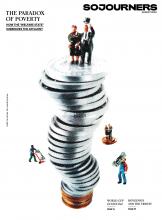How the “welfare state” is designed to subsidize affluence rather than fight poverty.
Immigration
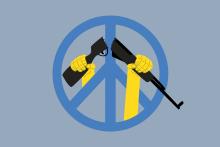
THE NUMBER OF asylum seekers from Russia arriving at the U.S. southern border has risen dramatically in the past year. Hundreds of thousands of Russians have left their homeland since President Putin ordered the invasion of Ukraine. Some fear increasing economic hardship and that Putin will impose martial law and close the borders, and some are fleeing to follow their conscience.
In September, the Kremlin announced its first military mobilization for soldiers to fight in Ukraine, prompting the departure of tens of thousands of Russian men. A second mobilization may occur this fall. Many of those who have fled hold religious or moral beliefs that tell them that participation in Russia’s invasion of Ukraine is wrong. Many young men have come to the United States seeking asylum as conscientious objectors (COs) based on their refusal to be drafted into Russia’s military for reasons of moral conscience.
At the Center on Conscience and War, we began hearing about these cases in fall 2022 — and found very few resources to support them. A handful of immigration attorneys are taking on a few of these cases, but the demand is much greater than the help available. This spring, our center initiated a Freedom of Information Act request to learn exactly how many of the asylum seekers are making claims based on conscientious objection to military conscription.

WHEN WE LOOK at the record numbers of migrants who are seeking refuge and asylum in the U.S. and the deplorable ways they have often been treated, it’s easy to lose faith. The U.S. immigration system seems so hopelessly broken, and hateful rhetoric and bad faith are so abundant among our politicians, that it can often feel as if there’s nothing we can do to fix it. Yet, if we take seriously both the Hebrew scripture command to welcome the stranger and Jesus’ call to treat migrant people as we would treat him (Matthew 25), then we cannot let ourselves succumb to despair or resignation. People who have been forced to leave dangerous conditions in their home countries to seek asylum are depending on us to not give up fighting for a fairer and more humane immigration and asylum system. Sadly, Congress has lacked sufficient political will to pass the sweeping overhaul of our immigration laws that is so sorely needed.

After Title 42 restrictions at the U.S. border ended on May 11, debates about immigration have heated up again — focused mostly on reform, border security, or refugees’ needs.
But the treatment of immigrants is deeply intertwined with religious freedom as well. As a scholar of religious ethics who studies immigration, I am interested in recent cases that highlight growing tensions between immigration policies and religious groups’ commitments to pastoral and humanitarian care.

Let’s be clear: Neither Title 42 nor Biden’s new policies meet the biblical standard of “welcoming the stranger,” which for us includes thousands of migrants at the U.S.-Mexico border seeking refuge from violence and extreme poverty.

WHEN BSHARA NASSAR moved to the United States in 2011, he quickly noticed that something was missing. “There was no place for our story to be told,” said Nassar, a Palestinian Christian born in Jerusalem and raised in Bethlehem. (“My family has been Christian for 2,000 years,” Nassar told Sojourners. “We didn’t convert — the faith was born here!”) But he felt the story of the Palestinian people “was always being distorted or minimized — it was always about either ‘victims’ or ‘violence.’” So, in 2015, Nassar started visiting universities, churches, and community centers with a “traveling exhibit” of only two pieces, focused on refugees from Palestine. “It took a while to build momentum,” Nassar said.
Nassar is now director of the Museum of the Palestinian People, situated in a rowhouse near Dupont Circle in Washington, D.C. Through the museum, Nassar said, “We want to share our story from our perspective — who we are, where we come from. For too long our stories have been told by others, who portray us in often negative stereotypes. We want to share with the world who Palestinians truly are.”
The museum’s latest exhibition focuses on tatreez, the art of Palestinian embroidery, and looks at the role of “material culture and art history in preserving a nation’s identity,” according to exhibit curator Wafa Ghnaim. For Ghnaim, the first Palestinian embroidery instructor at the Smithsonian Museum and now a senior research fellow for the Metropolitan Museum of Art, the exhibit is about addressing the question, “How do we reclaim our heritage?” The exhibit includes embroidered dresses from before and after 1948—the year of what Palestinians call the Nakba, or catastrophe, when according to the Institute for Palestine Studies, two-thirds of the Palestinian population was uprooted as the State of Israel was created. “The dresses created before 1948 reflect a village identity,” Ghnaim, an expert in Palestinian traditional dress, told Sojourners, “while dresses created after 1948 reflect a national identity.”
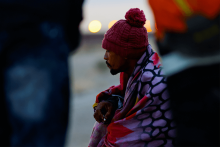
I am not sure what else needs to happen so the entire U.S. church wakes up to the realities of the evils entrenched in our immigration system. Honoring the dignity of all people is our calling as Christians; no other entity is tasked with recognizing the image of God in every person. Our Latine brothers and sisters are leading the way, but the whole church should be outraged; we should be demonstrating without ceasing. We should not let people sleep until they see the humanity of every migrant.
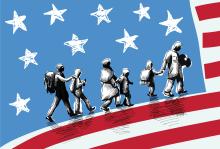
IN 2016, PEOPLE of faith in the city of Billings, Mont., gathered to call for their community to get more involved in resettling refugees. With growing violence, persecution, and strife around the world and a record number of people forced to flee their homes, this community had the heart to help.
But the closest refugee resettlement office in the state was in Missoula, a 345-mile road trip west on I-90. The United States traditionally requires refugees to be resettled with families and relatives or close to these resettlement sites, which help new arrivals land on their feet and access needed services. For Billings — and for many other like-minded communities across the country — it was a logistical challenge to participate in the work of welcome.
Earlier this year, that changed. On Jan. 19, the Biden administration launched Welcome Corps, a new initiative giving everyday Americans the opportunity to sponsor refugees. Groups of at least five can now apply to form “private sponsorship groups,” which are responsible for welcoming refugee newcomers into their communities. These groups agree to assist in providing initial housing; as well as support access to health care, school enrollment, and employment opportunities; and otherwise engage directly in the life-changing work of refugee resettlement.

During his recent visit to the U.S.-Mexico border, President Joe Biden announced changes to border enforcement and the asylum process — the legal process that allows people fleeing danger to seek safety in the U.S. One of the most concerning changes was an expansion of Title 42, a public health policy invoked by former President Donald Trump that weaponized the pandemic to turn away many Black and brown migrants looking for asylum.
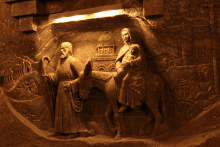
Late last week, the White House announced new enforcement measures at the U.S.-Mexico border. Among other things, these measures expand the pathway for migrants from Haiti, Cuba, and Nicaragua to receive two years of legal entry if they have an eligible U.S. sponsor — and allow the administration to expedite removal of migrants from these nations who cross into the U.S. from Mexico without documentation. It’s unclear what the full human impact of these measures will be, but when I read the news, my heart broke for those whose pathway to safety just slipped even further out of reach.
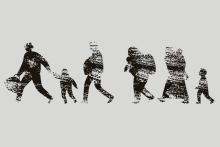
I KNEW ALMOST immediately it was bad news.
“Maria was separated at the border from her auntie,” my friend said in a phone call. “We don’t know where she is. Her auntie was sent back to Mexico and we think is being held by a drug cartel. They separated them under Title 42.”
I felt sick. Four-year-old Maria (not her real name) and her aunt were fleeing violent circumstances. They arrived at the U.S.-Mexico border to exercise their legal right — protected by both international and U.S. law — to request asylum, as other members of Maria’s family had done prior to the COVID-19 pandemic.
In March 2020, everything changed. The Trump administration, through the Centers for Disease Control and Prevention (CDC), invoked a rarely used subsection of public health code called Title 42 to close U.S. borders to asylum seekers and unaccompanied children under the guise of preventing the spread of COVID-19. It made that decision against the advice of many public health experts, including some within the CDC, who agreed there was no public health rationale for a ban on asylum seekers as a group. Though the border remained open to truckers, temporary workers, students, and others, border agents turned back asylum seekers to Mexico or their home country.

Charismatic leaders such as Jean Vanier can inspire and transform us. But when these leaders commit abuse, how do the movements they ignite pick up the pieces?

JANUARY OPENS THE season of Epiphany: In the North, the light begins to last longer, and we reawaken to the world outside our doors. Each Jan. 6, my family performs the old European Epiphany ritual of “chalking the door” to our home. While I pray, my spouse hoists our kids up to write the blessing on our front lintel. This year the markings will look like this: 20+C+M+B+23. Twenty marks the beginning of the year. The letters recall the Magi (Caspar, Melchior, and Balthazar) whose visit we celebrate and also the Latin prayer: Christus mansionem benedicat (“May Christ bless the house”). The final number closes out the year. The markings are strange. We’re asked about them often. We recall the great light that led the people out of Egypt, the great star that guided the Magi, and the Holy Family’s hospitality. These signs keep evil spirits out and invite God’s Spirit in. And that’s a lot to explain to the FedEx guy.
But Epiphany is a lot! It invites us to explore the complex roles we play in God’s redemption: our complicity in evil as we reach for the good, our relationship to violence, and how we’ll practice hospitality post-COVID.
In this season we also travel with the community of Jesus-followers at Corinth. Much like them, Christians today have become increasingly divided — even among those who agree on the values of compassion, community, and caring for those most vulnerable. The pandemic has made it difficult to find a vision for how to live out our shared values. What striking illumination will this season bring?

A fringe Christian ideology helped stoke an out-of-control gun culture. People of faith are working to take back the conversation.

The message of assimilation makes me uncomfortable because it requires me to celebrate the loss of other people’s culture, traditions, and languages in order to alleviate the fears that white people, including Christians, might have about a diverse society where their position as power brokers of society may be threatened. It is akin to saying, “White Christians, please do not fear immigrants because they, too, will submit to white supremacy and blend into it as best as they can, even with their non-white skin and features.”
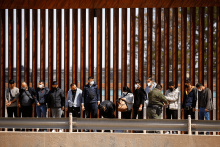
The Biden administration is fighting a legal battle to end the use of Title 42, a policy that has effectively closed the U.S. Southern Border to asylum-seekers for more than two years. Numerous faith-based organizations that work with immigrants have called on the administration to return to pre-pandemic asylum processing.
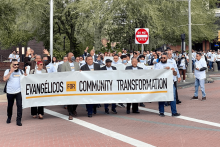
One measure, an executive order from Florida Gov. Ron DeSantis, jeopardizes foster care licenses for anyone who takes in unaccompanied immigrant children who arrive in the country without authorization. The other, a bill being fast-tracked through the state legislature, would bar state and local governments from contracting with businesses that knowingly transport undocumented immigrants, including bus companies or airlines.

While white evangelical support has decreased, Black Protestant support for a pathway to citizenship increased from 70 percent in 2013 to 75 percent in 2021. Advocates are still working to pass a pathway to citizenship this spring. Immigration justice work is now widely recognized as anti-racism work — work to dismantle the systems of white supremacy that oppress us all. Our theology of the imago dei, of the image of God in every person, fuels both our voter protection advocacy and our work to create a pathway to citizenship for undocumented immigrant people. We are working to honor the God-given dignity and full personhood of every person by securing the legal right to vote and a legal status for undocumented immigrant people.
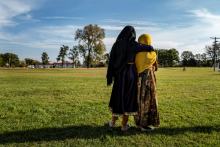
In a hearing on Capitol Hill last week, leaders from humanitarian nonprofits and resettlement agencies asked the House Homeland Security Committee to pressure the Biden administration to do more to help resettle evacuated Afghans into U.S. communities.
Their demands come as thousands of Afghans who had initially been housed at U.S. military bases in Virginia, Wisconsin, Texas, New Jersey, New Mexico, and Indiana are moving into communities in the United States. At least an additional 55,000 Afghans remain at the military bases.
